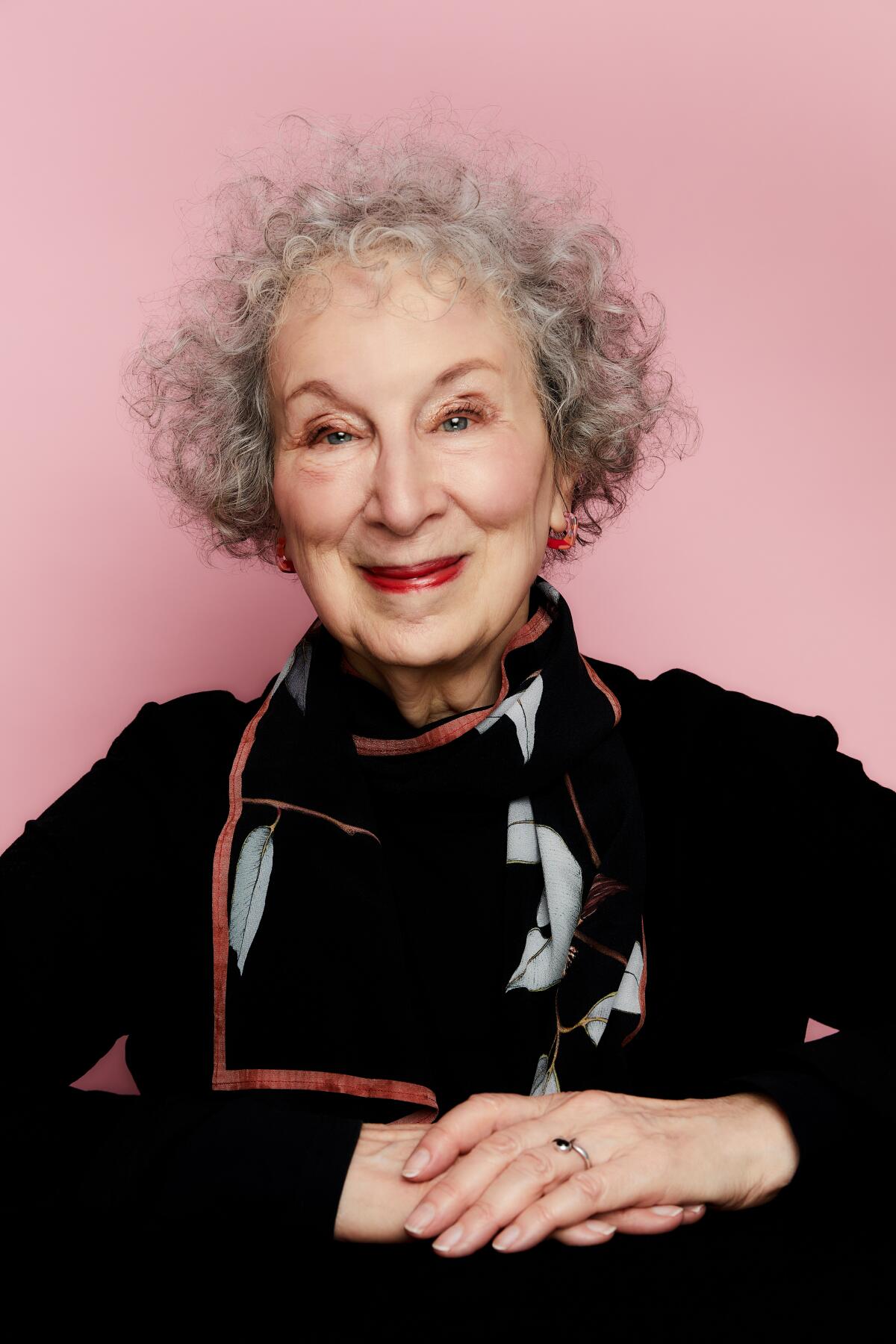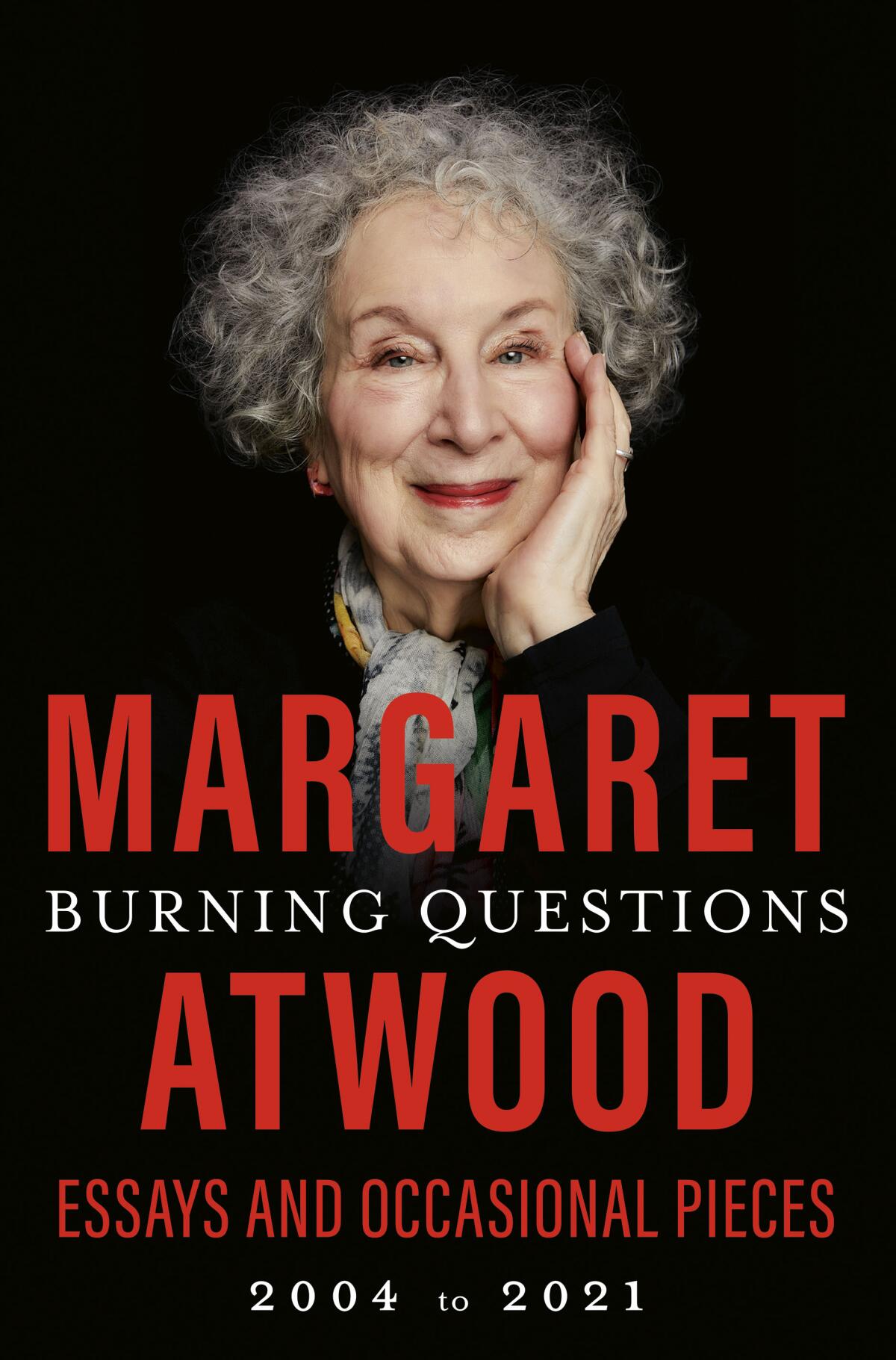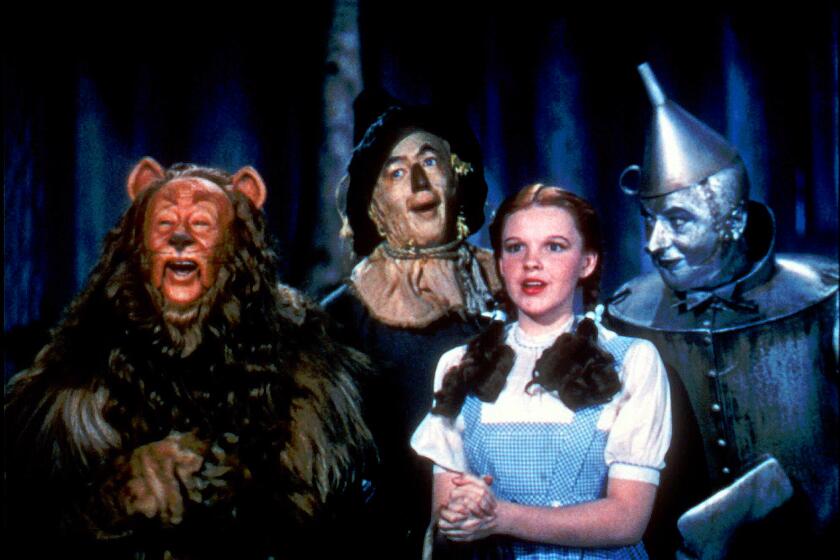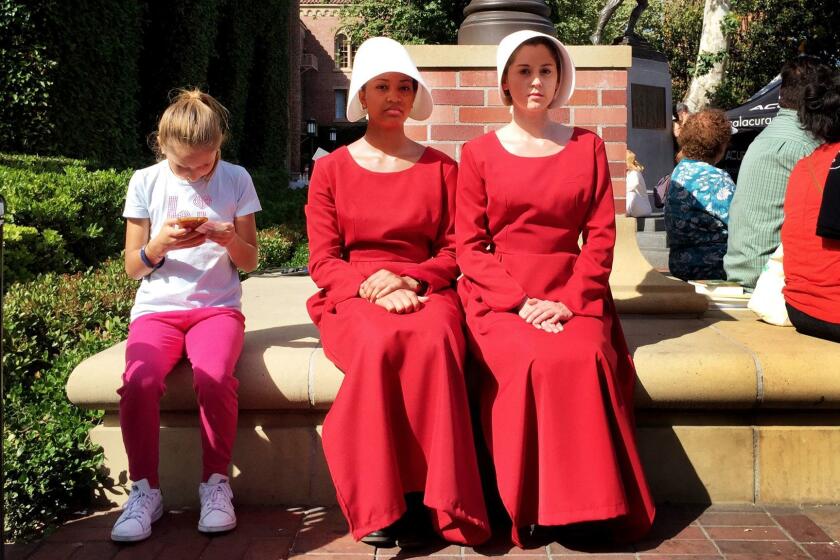Margaret Atwood is not your ‘elderly icon’ or ‘witchy granny.’ She’s better than that

- Share via
On the Shelf
Burning Questions: Essays and Occasional Pieces, 2004 to 2021
By Margaret Atwood
Doubleday: 496 pages, $30
If you buy books linked on our site, The Times may earn a commission from Bookshop.org, whose fees support independent bookstores.
Margaret Atwood has earned her place as a literary seer, a prophet, a sage elder — or, as she recently described herself, “elderly icon or scary witchy granny.” She’s frequently asked to speak about women’s issues, because of “The Handmaid’s Tale,” and the looming climate catastrophe, because of the MaddAddam trilogy. Audiences want to hear from the 82-year-old author whose fiction foresees the rise of a patriarchal fascist state and cataclysmic environmental collapse.
“People are deeply worried about the future right now,” Atwood told me during a phone call from her home in Canada. “Things are in turmoil — partly because of climate change; partly because democratic norms and procedures that we took for granted and believed represented the true, the good and the beautiful, have been tossed out the window.”
This is how Atwood speaks off the cuff, with insight, poetry and power. Her new book showcases these talents: “Burning Questions: Essays and Occasional Pieces, 2004 to 2021” is heavy on the speeches. Chalk some of that up to “The Handmaid’s Tale,” published in 1985 and adapted into a hit Hulu series that launched in 2017, after Donald Trump began his first year as president. In addition to women’s issues, these 65 pieces address topics as varied as debt, Shakespeare, the future, writing, trees, the work of Alice Munro (once while walking with Alice Munro) and the trilobite skirt she made in high school.
Atwood told me she’s just a working writer — “I’m a freelancer. I don’t have a pension” — and she takes assignments as they come to her. That explains why this, her third collection of nonfiction, includes fewer book reviews and more tributes to departed writers, such as the appreciation titled “We Lost Ursula Le Guin When We Needed Her the Most.” But it may also be a bit of Canadian modesty.
In a weeklong writer’s diary, Atwood chronicles procrastinating, looking for a recipe box and birdwatching, but toward the end she writes, “I sat right down, and here it is. 1208 words, 120 minutes.” BOOM. That’s fast. (Faster than me, I bet my editor is thinking). She doesn’t outline her fiction, and she didn’t write out the many speeches in the book.
The author of “The Handmaid’s Tale” and “The Testaments” unpacks the way “all speculative fiction writers are writing about the present and the past.”
That makes it all the more impressive how seamlessly Atwood weaves history, incident and literary allusions into her work. If climate change and the future are constant themes, so are Shakespeare’s plays and L. Frank Baum’s “The Wonderful Wizard of Oz.” Asked why “Oz” retains such metaphorical power for her, she plunged into a nimble riff [see sidebar] that was both explanation and exploration.
To follow her along in these thoughtful, expansive arguments on the page is a pleasure. Atwood resists contemporary essay trends by rarely getting emotional, despite writing a bit about her partner, Graeme Gibson, who died in 2019. She references his illness, vascular dementia, and provides new introductions to two of his books, but she doesn’t spend time writing about her sadness or grief.
I tried to get her to discuss the role of emotion in essays. “I don’t have to stir myself up,” she deflected. “That’s not why you write them. You write them for the reader.” I paused before asking another question, leaving space on the phone line. “So you’re wondering why I’m not sort of weeping on the page. Is that it?” A little bit, I admitted. But she detoured again with an anecdote about an old romance magazine she references in the book. In a roundabout way, while drawing distinctions among modes of nonfiction, she was making it clear that memoir is not what she’s doing here.

Her stubbornness has gotten Atwood in trouble on Twitter, where she has 2 million followers. Quick to defend free speech and due process, sometimes without her customary nuance, Atwood has wound up being called a “bad feminist,” which she addresses not entirely successfully in the book. In the fall of 2021 she shared an article promoting an anti-trans agenda and then doubled down without listening to heartfelt pleas from her fans (despite having written thoughtfully about gender fluidity). Rather than answering questions about Twitter directly, she told another deftly deflecting story.
Usually, though, like her fellow speculative fiction writer William Gibson, Atwood is so attuned to evolving dilemmas that it seems she can see into the future. Asked to give the Massey Lectures in 2008, she wrote “Payback: Debt and the Shadow Side of Wealth,” and by the time she delivered it her predicted economic crisis was underway. In a 2006 speech she mused on how an asteroid streaking toward Earth should prompt a collective international intervention, as compared to the lack of action on climate change — basically outlining the plot of the 2021 movie “Don’t Look Up.”
Were the filmmakers listening in? Atwood laughed at the idea. “Maybe they were,” she said. “But you know, it doesn’t take a huge amount of brain power to figure that out. Environmentalists, conservationists, biologists have been talking about this for really quite a long time.”
The author of ‘The Handmaid’s Tale’ and a new essay collection explains the ‘woman problem’ embedded within L. Frank Baum’s ‘Wonderful Wizard of Oz.’
Atwood grew up around scientists. Her father was an entomologist who brought the family to live in the remote woods of Canada for three quarters of the year. As she quips in the book, “Other families stopped for ice cream cones. Ours stopped for infestations.”
While she’s well-known as a futurist, Atwood is adept at looking backward. Two of her novels, “The Blind Assassin” and “Alias Grace,” are historical. “If you’re writing about the past, you have to be more meticulous because other people can check it,” she said, laughing. “Whereas if you’re writing about the future, you get to make it up, but you have to be faithful to the things that you’ve made up.”
Atwood has her own slightly unsettling take on history. She writes of it cycling like a wheel and repeated what she says in the book. “There is no right side of history,” she told me. “There is no wrong side of history.”
But what about Martin Luther King Jr., who said that the arc of history bends toward justice? “Love it. It’s just not true.”
She said those who insist on right or wrong sides are “assuming that history is going to go in one direction, like the Yellow Brick Road to Oz. But it’s not necessarily true. People then wring their hands in despair when we have things happen that we consider ‘going backwards.’ But the perky side to that is they can go forward again, it’s happened many times.”
I’ve lost count of the articles I’ve read about Hulu’s adaptation of Margaret Atwood’s 1985 novel “The Handmaid’s Tale” that used the word “timely.”
In conversation as in her writing, Atwood leavens her sometimes-fatalistic predictions with a slow-drip, wry humor. That may be an important reason why so many people are listening to someone best known for making stuff up. Even when she’s writing about horrible things, she’s often pretty funny.
“It’s bad of me,” she conceded. “I’m very naughty. I should always be very serious, right?”
What is the appropriate way for her to be after publishing more than 60 books? After winning the Booker Prize twice and just about every other literary prize? (Apart from the Nobel, but there’s still time.)
In 2013, memorializing another departed peer, Doris Lessing — who upon winning the Nobel famously reacted with an understated and exasperated “Oh, Christ” — Atwood wrote, “If you don’t think of yourself as an august personage, you don’t have to behave yourself.” Many of our provocateurs pontificate because their egos are overblown; with her casual humility, Atwood is taking risks unbefitting of a nice old lady.
Kellogg is formerly books editor of The Times.
After her parents fell ill, Victoria Chang, finalist for a Times Book Prize, wrote ‘Obit,’ poems styled as obituaries of loved ones — and herself.
More to Read
Sign up for our Book Club newsletter
Get the latest news, events and more from the Los Angeles Times Book Club, and help us get L.A. reading and talking.
You may occasionally receive promotional content from the Los Angeles Times.









